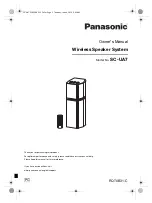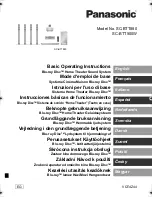
URL: https://www.toa.jp/
133-01-00247-00
5. INSTALLATION
Step 1. Make a 150 ±3 mm (5.91" ±0.12") diameter hole in
the ceiling.
Input connector
2
3
Ceiling
Speaker spring
Suspension bolt
Spring catcher
25 mm (0.98") max.
Cloth dust cover
(with the input connector exposed)
Bent position
Mounting bracket
Thumb screw
Ceiling clamp
Note
Max. 30 mm (1.18")
allowable with the
ceiling clamp bent
as designated above.
Step 2. Place the mounting bracket in the hole and secure
it with the thumb screws in the two ceiling clamps.
Note
A suspension bolt may be used instead for fixing
the mounting bracket.
Step 3. Hook one speaker spring (V-shaped spring) in the
spring catcher of the bracket.
Step 4. Make wiring.
4-1. Insert the lead-in cables (cables from the amplifier)
and lead-out cables (cables to other speakers)
into the input connector.
[When making a bridge connection]
Input connector
Matching transformer
Speaker cable
(From the amplifier)
Speaker cable
(To the next speaker)
Input connector
From
the amplifier
To
the next speaker
COM (–)
HOT (+)
9 mm (0.35")
Applicable cable
Solid wire: ø0.8 – ø1.6 mm
(equivalent to AWG 20 – 14)
4-2. Change the input impedance as needed.
The speaker's input is factory-preset to 1.7 kΩ.
When changing the input impedance, detach the
black wire connected to the matching transformer,
and reinsert it into the desired input tap referring
to the table below.
Step 5. Hook another speaker spring in another catcher.
Then, press the speaker assembly into the
mounting bracket. Force of the springs will keep
the speaker in place.
3.3kΩ
1.7kΩ
COM
6.7kΩ
13kΩ
Matching transformer
HOT (Black)
COM (White)
Impedance 1.7 kΩ 3.3 kΩ 6.7 kΩ 13 kΩ
100 V line
6 W
3 W
1.5 W
0.8 W
70 V line
3 W
1.5 W
0.8 W
0.4 W
Traceability Information for Europe
Manufacturer:
TOA Corporation
7-2-1, Minatojima-Nakamachi, Chuo-ku, Kobe, Hyogo, Japan
Authorized representative:
TOA Electronics Europe GmbH
Suederstrasse 282, 20537 Hamburg, Germany
View with dust cover removed




















